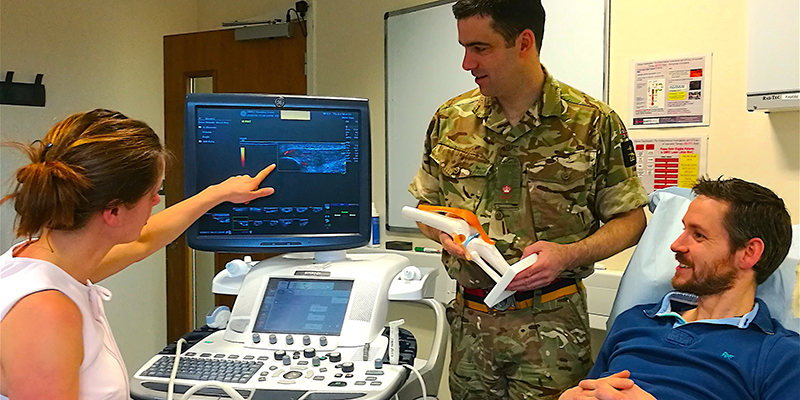
Loughborough University academics from the NCSEM-EM are collaborating with Stanford Hall’s Academic Department of Military Rehabilitation (ADMR) on a major project that could help UK military personnel with tendon problems.
The Biomechanical Associations and Efficacy of Injectable Therapies in Tendinopathy (BEFIT) study is funded with a grant from the Higher Education Funding Council for England (HEFCE) and brings together university academics and Ministry of Defence (MOD) collaborators to investigate risk factors and treatment of tendon pain in the regular armed forces.
The main focus of the project is a randomised controlled trial investigating the effect of high volume injection therapy in Achilles and patellar tendinopathy. There have been some encouraging results from other centres but currently there is no controlled study to provide evidence for the use of these injections in military personnel.
Commenting on the importance of this programme the Director of Defence Rehabilitation, Col John Etherington, said: “Reducing musculoskeletal injuries (MSKI) remains our main effort in improving the health and operational readiness of our personnel. We know that approximately 60% of medical downgradings and 60% of medical discharges are associated with MSKI. Getting the very best treatment at the right place and at the right time is key to us helping our personnel fulfil their potential. I am delighted that we have been able to pool resources in this type of project to drive forward best practice.”
The research has made good use of the Help for Heroes motion tracking laboratory at DMRC Stanford Hall together with Loughborough University biomechanics. Factors which may predict tendon pain and its response to treatment are also being analysed.
Gp Capt Alex Bennett the Head of Research at DMRC Stanford Hall and Defence Professor for Rehabilitation described the need for this research within defence: “This well designed clinical trial has been approved not only by the MOD Research Ethics Committee but also the Medicines and Healthcare products Regulatory Agency and gives us the best opportunity to test fully whether these injections can benefit our patients.
Professor Mark Lewis, Dean of the School of Sport, Exercise and Health Sciences at Loughborough University said: “The relationship between Loughborough University and the Academic Department of Military Rehabilitation at Stanford Hall via the NCSEM is of critical importance to the university. This project not only cements that relationship but, more importantly, has the potential to deliver huge benefits to tendinopathy sufferers in the UK military and more widely to the general public. We are grateful to HEFCE for supporting this project through a Catalyst fund.
A dedicated BEFIT study clinic has been established at DMRC Stanford Hall. Anyone with questions about the research programme should email Sqn Ldr Robert Barker-Davies.
Publications linked to the project:
- Barker-Davies RM, Roberts A, Watson J, et al. Kinematic and kinetic differences between military patients with patellar tendinopathy and asymptomatic controls during single leg squats. Clin Biomech 2019;62:127-135
- Barker-Davies RM, Roberts A, Bennett AN, et al. Single leg squat ratings by clinicians are reliable and predict excessive hip internal rotation moment. Gait Posture 2018;61:453-58
- Watson J, Barker-Davies RM (joint first author), Bennett AN, Fong D, Wheeler P, Lewis M, Ranson C. Sport and Exercise Medicine consultants are reliable in assessing tendon neovascularity using ultrasound Doppler BMJ Open Sport Exerc Med 2018;4(1)
- Barker-Davies RM, Nicol A, McCurdie I, et al. Study protocol: a double blind randomised control trial of high volume image guided injections in Achilles and patellar tendinopathy in a young active population. BMC Musculoskelet Disord 2017;18(1):204